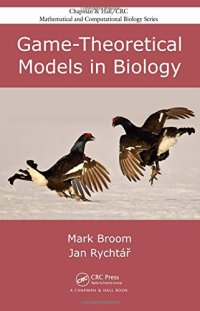
Ebook: Game-Theoretical Models in Biology
Author: Mark Broom Jan Rychtar
- Genre: Mathematics // Game Theory
- Tags: Evolution, Fossils, Game Theory, Genetics, Molecular Biology, Organic, Paleontology, Science & Math, Applied, Biomathematics, Differential Equations, Game Theory, Graph Theory, Linear Programming, Probability & Statistics, Statistics, Stochastic Modeling, Vector Analysis, Mathematics, Science & Math, Combinatorics, Pure Mathematics, Mathematics, Science & Math, Biology & Life Sciences, Anatomy & Physiology, Biology, Botany, Ecology, Zoology, Science & Mathematics, New Used & Rental Textbooks, Specialty Boutique, Mathematics, Al
- Series: Chapman & Hall/CRC Mathematical and Computational Biology
- Year: 2013
- Publisher: Chapman and Hall/CRC
- Edition: 1
- Language: English
- pdf
Covering the major topics of evolutionary game theory, Game-Theoretical Models in Biology presents both abstract and practical mathematical models of real biological situations. It discusses the static aspects of game theory in a mathematically rigorous way that is appealing to mathematicians. In addition, the authors explore many applications of game theory to biology, making the text useful to biologists as well.
The book describes a wide range of topics in evolutionary games, including matrix games, replicator dynamics, the hawk-dove game, and the prisoner’s dilemma. It covers the evolutionarily stable strategy, a key concept in biological games, and offers in-depth details of the mathematical models. Most chapters illustrate how to use MATLAB® to solve various games.
Important biological phenomena, such as the sex ratio of so many species being close to a half, the evolution of cooperative behavior, and the existence of adornments (for example, the peacock’s tail), have been explained using ideas underpinned by game theoretical modeling. Suitable for readers studying and working at the interface of mathematics and the life sciences, this book shows how evolutionary game theory is used in the modeling of these diverse biological phenomena.